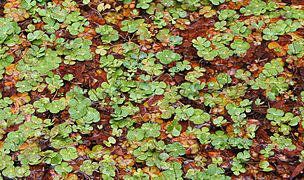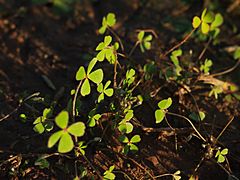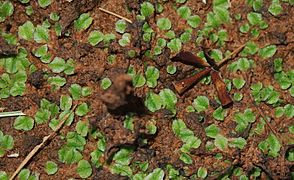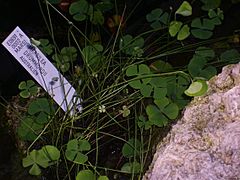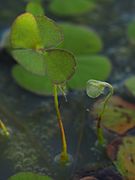Nardoo facts for kids
Quick facts for kids Nardoo |
|
|---|---|
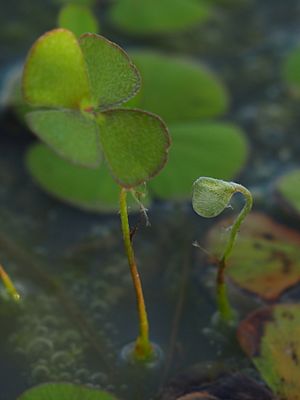 |
|
| M. drummondii leaf and fiddlehead | |
| Scientific classification | |
| Genus: |
Marsilea
|
| Species: |
drummondii
|
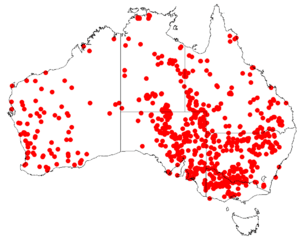 |
|
| Occurrence data from the Australasian Virtual Herbarium | |
| Synonyms | |
|
Marsilea drummondii var. hirsutissima (A.Braun) Domin |
|
Marsilea drummondii is a special kind of fern often called nardoo. It grows naturally in Australia, especially in the middle parts of the country. This plant is a water fern that loves to root in mud. It grows in quiet water, sometimes up to one meter deep. Its leaves float on the water's surface.
Nardoo is a perennial plant, meaning it lives for more than two years. It has rhizomes, which are like underground stems that help it spread. After floods, nardoo can grow very quickly. It can form thick mats on the water or cover the ground like a carpet when floodwaters go down.
Contents
What is Nardoo?
Nardoo is a type of fern that looks a bit like a four-leaf clover. Its fronds (leaves) usually have two pairs of leaflets. When the plant is not floating, these fronds stand upright. Nardoo can look different depending on where it grows. It can be found in many kinds of wet places.
How Nardoo Reproduces
Nardoo produces special seed-like cases called sporocarps. These sporocarps are very tough. They can stay alive for up to 50 years! They only release their tiny spores after being soaked in water for a long time.
Birds help spread the sporocarps. They might eat them, but the sporocarps pass through their bodies without being digested. Flowing water also helps carry the sporocarps to new places.
Nardoo as Food
For a very long time, Aboriginal people have used nardoo sporocarps for food. They would collect them, roast them, and then grind them into a powder. This powder could then be mixed with water to make a dough.
A Warning About Nardoo
It's important to know that nardoo can be harmful if not prepared correctly. It contains a substance called thiaminase. This substance destroys thiamine, which is a very important vitamin (also known as Vitamin B1). If someone eats a lot of nardoo without it being properly prepared, it can cause a serious illness called beriberi.
Nardoo has even caused problems for animals like sheep and for people in the past. For example, some explorers on the Burke and Wills expedition got sick from eating nardoo that wasn't prepared right. To be safe, nardoo must be heated thoroughly before eating. This heat destroys the thiaminase, making the food safe.
Earliest Records of Nardoo
One of the oldest recorded nardoo specimens in an Australian plant collection is called MEL 0052999A. It was collected way back in 1825 by a person named Alan Cunningham. He found it near a place called Curlewis in New South Wales.
Gallery


